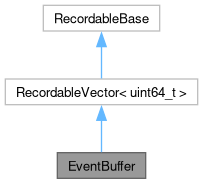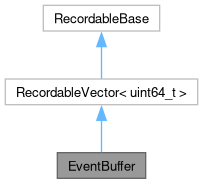

Public Member Functions | |
| EventBuffer (int maxEvents=0) | |
| int | getNumElementsInEpoch () const |
| virtual void | resize (int maxEvents) override |
| uint64_t | operator[] (int i) const |
| template<class Archive > | |
| void | serialize (Archive &archive) |
| Cereal serialization method. | |
Recorder Interface | |
virtual methods in RecordableBase for use by Recorder classes | |
| virtual variantTypes | getElement (int index) const override |
| Get the value of the recordable variable at the specified index. | |
| virtual int | getNumElements () const override |
| Get the number of elements that needs to be recorded. | |
| virtual void | setDataType () override |
| Return the runtime data type info of unit64_t. | |
| virtual const string & | getDataType () const override |
| Get the basic data type of the recordable variable. | |
| virtual void | startNewEpoch () override |
Vertex and Edge Interface | |
EventBuffer interface for use by the Vertex and Edge classes | |
| void | clear () |
| void | insertEvent (uint64_t timeStep) |
| uint64_t | getPastEvent (int offset) const |
 Public Member Functions inherited from RecordableVector< uint64_t > Public Member Functions inherited from RecordableVector< uint64_t > | |
| RecordableVector () | |
| Constructor. | |
| virtual void | assign (size_t size, const uint64_t &value) |
| Assigns the given value to the vector for the specified size. | |
| uint64_t & | operator[] (int index) |
| Overload the operator to set the value at a specific index. | |
| void | push_back (const uint64_t &value) |
| Add a new value to recordable vector. | |
| const std::vector< uint64_t > & | getVector () const |
| Method to retrieve the underlying std::vector<T> | |
| const uint64_t * | data () const |
| Gets const pointer to contiguous host memory array. | |
| void | serialize (Archive &archive) |
| Cereal serialization method. | |
 Public Member Functions inherited from RecordableBase Public Member Functions inherited from RecordableBase | |
| template<class Archive > | |
| void | serialize (Archive &archive) |
| Cereal serialization method. | |
Friends | |
| class | AllIFNeurons |
| class | AllSpikingNeurons |
Additional Inherited Members | |
 Protected Member Functions inherited from RecordableBase Protected Member Functions inherited from RecordableBase | |
| RecordableBase ()=default | |
| prevents any code outside this class from creating a RecordableBase object | |
 Protected Attributes inherited from RecordableVector< uint64_t > Protected Attributes inherited from RecordableVector< uint64_t > | |
| vector< uint64_t > | dataSeries_ |
| Holds the event time steps. | |
 Protected Attributes inherited from RecordableBase Protected Attributes inherited from RecordableBase | |
| std::string | basicDataType_ |
| the basic data type in the recorded variable | |
Detailed Description
Definition at line 31 of file EventBuffer.h.
Constructor & Destructor Documentation
◆ EventBuffer()
| EventBuffer::EventBuffer | ( | int | maxEvents = 0 | ) |
Create EventBuffer that is sized appropriately
Create and size the buffer so that it can hold a set number of events. Once an EventBuffer is created with a nonzero size, it should not be resized (generally, doing that will cause a major bug in the simulator). Note that the buffer size will be set to maxEvents+1, to distinguish between an empty and a full buffer.
- Parameters
-
maxEvents Defaults to zero; otherwise, buffer size is set
Definition at line 16 of file EventBuffer.cpp.
Member Function Documentation
◆ clear()
| void EventBuffer::clear | ( | ) |
Reset member variables consistent with an empty buffer
Definition at line 63 of file EventBuffer.cpp.
◆ getDataType()
|
overridevirtual |
Get the basic data type of the recordable variable.
Reimplemented from RecordableVector< uint64_t >.
Definition at line 39 of file EventBuffer.cpp.
◆ getElement()
|
overridevirtual |
Get the value of the recordable variable at the specified index.
Set up a string representing the basic data type Get the value of the recordable variable at the specified index.
- Parameters
-
index The index of the recorded value to retrieve.
- Returns
- A variant representing the recorded value (uint64_t, double, or string).
- Parameters
-
index The index of the recorded value to retrieve.
- Returns
- A variant representing the recorded value (uint64_t, double, or string).
Reimplemented from RecordableVector< uint64_t >.
Definition at line 33 of file EventBuffer.cpp.
◆ getNumElements()
|
overridevirtual |
Get the number of elements that needs to be recorded.
Reimplemented from RecordableVector< uint64_t >.
Definition at line 49 of file EventBuffer.cpp.
◆ getNumElementsInEpoch()
| int EventBuffer::getNumElementsInEpoch | ( | ) | const |
Get number of events in the current/preceding epoch
Getting the number of events in the current epoch (or, in between epochs, the number of events in the preceding epoch) is not the same as the number of events in the buffer, because the buffer retains events from the previous epoch, too.
Definition at line 44 of file EventBuffer.cpp.
◆ getPastEvent()
| uint64_t EventBuffer::getPastEvent | ( | int | offset | ) | const |
Get an event from a time in the past
Get the time step for an event in the past. An offset of -1 means the last event placed in the buffer; -2 means two events ago.
- Parameters
-
offset How many events ago. Must be negative. If that event isn't in the buffer, or if the buffer is empty, returns ULONG_MAX.
Definition at line 94 of file EventBuffer.cpp.
◆ insertEvent()
| void EventBuffer::insertEvent | ( | uint64_t | timeStep | ) |
Insert an event time step
Insert an event time step into the buffer (i.e., enqueue it in the circular array implementation of the queue).
- Precondition
- The buffer is not full
- Parameters
-
timeStep Value to store in buffer
Definition at line 83 of file EventBuffer.cpp.
◆ operator[]()
| uint64_t EventBuffer::operator[] | ( | int | i | ) | const |
Access event from current epoch
Access an element of the buffer as though it is an array or vector with element 0 being the first event in the epoch (element numElementsInEpoch_ - 1 would be the last element in the epoch).
- Parameters
-
i element number
Definition at line 71 of file EventBuffer.cpp.
◆ resize()
|
overridevirtual |
Resize event buffer
Note that the buffer size will be set to maxEvents+1, to distinguish between an empty and a full buffer.
- Precondition
- current buffer must be empty
- Parameters
-
maxEvents Buffer size
Reimplemented from RecordableVector< uint64_t >.
Definition at line 54 of file EventBuffer.cpp.
◆ serialize()
| void EventBuffer::serialize | ( | Archive & | archive | ) |
Cereal serialization method.
Definition at line 157 of file EventBuffer.h.
◆ setDataType()
|
overridevirtual |
Return the runtime data type info of unit64_t.
Reimplemented from RecordableVector< uint64_t >.
Definition at line 25 of file EventBuffer.cpp.
◆ startNewEpoch()
|
overridevirtual |
Start a new epoch
Resets the internal variables associated with tracking the events in a epoch. Note that this doesn't affect the contents of the buffer; it just resets things so that the epoch start is the index of the next event to be enqueued and that the number of events in the epoch is 0.
Reimplemented from RecordableVector< uint64_t >.
Definition at line 76 of file EventBuffer.cpp.
Friends And Related Symbol Documentation
◆ AllIFNeurons
|
friend |
Definition at line 32 of file EventBuffer.h.
◆ AllSpikingNeurons
|
friend |
Definition at line 33 of file EventBuffer.h.
The documentation for this class was generated from the following files:
- Simulator/Vertices/EventBuffer.h
- Simulator/Vertices/EventBuffer.cpp
Generated by